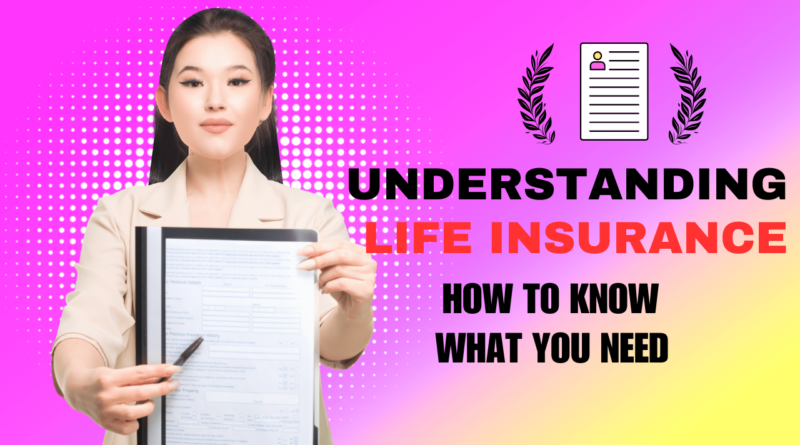Understanding Life Insurance: How to Know What You Need
Life insurance is an important part of planning for your future, but it can be confusing to figure out what you really need. With different types of policies and options available, it’s important to understand which one is right for you. Whether you’re looking to protect your family, cover debts, or plan your estate, this article will help you make the right choice for your situation, ensuring peace of mind for you and your loved ones.

How Life Insurance Works
Life insurance is a contract between you and an insurance company designed to provide financial security to your loved ones in the event of your death. Understanding how life insurance works is key to making informed decisions about your coverage needs.
The Components of a Life Insurance Policy
- Premiums: These are the payments you make to the insurance company in exchange for coverage. Premiums can be paid monthly, quarterly, or annually. The amount you pay depends on various factors, including your age, health, the type of policy, and the coverage amount.
- Death Benefit: This is the amount of money the insurance company agrees to pay your beneficiaries if you die while the policy is active. The death benefit is typically tax-free and can be used by your beneficiaries to cover any expenses they choose.
- Beneficiaries: These are the people or entities you designate to receive the death benefit. Beneficiaries can include your spouse, children, other family members, friends, or even charities.
- Policy Term: For term life insurance, the policy term is the length of time the policy is in effect. If you pass away during this period, the death benefit is paid out. If you outlive the term, the policy expires without a payout.
- Cash Value: For permanent life insurance policies, the cash value is a savings component that grows over time. This cash value can be accessed during your lifetime through withdrawals or loans, providing a financial resource while you’re still alive.
The Process of Getting Life Insurance
- Application: The first step in obtaining life insurance is applying for coverage. You’ll need to provide personal information, including your age, health history, lifestyle habits, and financial details.
- Underwriting: After you apply, the insurance company will evaluate your application through a process called underwriting. This may involve a medical exam, reviewing your medical records, and assessing any risk factors like smoking or dangerous hobbies. The underwriting process helps the insurer determine your risk level and set your premium.
- Approval and Policy Issuance: If your application is approved, the insurance company will issue a policy. You’ll receive a policy document outlining the terms, conditions, premiums, and death benefit. Once you start paying your premiums, your coverage begins.
- Maintaining the Policy: To keep your life insurance policy active, you must continue paying premiums on time. Missing payments can lead to a lapse in coverage, meaning your beneficiaries won’t receive the death benefit if you pass away while the policy is inactive.
Do I Need Life Insurance?
Determining whether you need life insurance depends on your personal circumstances, financial goals, and responsibilities. Life insurance isn’t a one-size-fits-all product, so it’s essential to assess your situation carefully.
Factors to Consider
- Family Dependence: If you have a spouse, children, or other family members who rely on your income or support, life insurance is critical. It ensures that your loved ones can maintain their lifestyle, pay for education, and cover daily expenses if you’re no longer around to provide for them.
- Debt Obligations: Consider your outstanding debts, such as a mortgage, car loans, student loans, or credit card debt. Life insurance can help prevent your family from being burdened with these debts if you pass away unexpectedly.
- Income Replacement: If your income is the primary or a significant source of financial support for your family, life insurance can replace that income, helping to cover living expenses, medical bills, and future needs.
- End-of-Life Expenses: Even if you don’t have dependents, life insurance can cover final expenses like funeral costs, which can be expensive. Without life insurance, these costs might fall on family members or loved ones.
- Legacy and Estate Planning: Life insurance can be a valuable tool in estate planning. It allows you to leave a financial legacy for your heirs, cover estate taxes, or make charitable donations.
Scenarios Where Life Insurance May Not Be Necessary
- No Dependents: If you’re single with no children or other dependents and have sufficient savings to cover your debts and final expenses, life insurance may not be necessary.
- Substantial Savings and Assets: If you have accumulated enough wealth to provide for your family and cover your financial obligations, life insurance might not be required.
- Elderly Individuals: For older individuals with grown children who are financially independent and no significant debts, the need for life insurance may be reduced.
Benefits of Life Insurance
Life insurance provides numerous benefits that extend beyond just a death benefit. Understanding these advantages can help you see the value of having a policy.
Financial Security for Your Loved Ones
The primary benefit of life insurance is the financial security it offers to your family. The death benefit can cover immediate expenses, such as funeral costs, medical bills, and any debts you leave behind. It can also ensure your family has the financial resources to maintain their standard of living, pay for education, and pursue their future goals.
Income Replacement
For families that depend on your income, life insurance provides crucial income replacement. This can help your spouse or partner cover everyday living expenses, such as mortgage or rent payments, utilities, groceries, and more. Without this income, your family might struggle to make ends meet.
Debt Repayment
If you have significant debts, life insurance can prevent those debts from becoming a burden on your loved ones. The death benefit can be used to pay off a mortgage, car loan, student loans, or credit card debt, ensuring that your family isn’t left with financial obligations they can’t manage.
Estate Planning and Legacy
Life insurance is an effective tool for estate planning, allowing you to leave a financial legacy for your heirs or donate to a charitable cause. It can also be used to cover estate taxes, ensuring that your beneficiaries receive the full value of your estate without having to sell off assets to pay taxes.
Tax Benefits
Life insurance policies often come with tax advantages. The death benefit is typically paid out tax-free to your beneficiaries, and the cash value component of a permanent policy grows on a tax-deferred basis. This means that you won’t pay taxes on the growth unless you withdraw or borrow from the cash value.
Peace of Mind
Perhaps the most significant benefit of life insurance is the peace of mind it provides. Knowing that your loved ones will be taken care of financially, even if something happens to you, allows you to live your life with less stress and worry.
Disadvantages of Life Insurance
While life insurance offers many benefits, there are also potential drawbacks that you should consider before purchasing a policy.
Cost
The cost of life insurance can be a significant factor, especially for permanent policies. Premiums for permanent life insurance, such as whole or universal life, can be expensive and may increase as you age or if your health declines. Even term life insurance, though generally more affordable, can add up over time, particularly if you renew the policy as you get older.
Complexity
Life insurance policies can be complex, with various options, riders, and features that can be confusing. It’s essential to fully understand the policy you’re purchasing, including any exclusions, limitations, and conditions. Without proper knowledge, you might end up with a policy that doesn’t meet your needs or paying for features you don’t require.
Limited Necessity
For some individuals, life insurance may not be necessary. If you’re single, have no dependents, and have enough savings to cover your final expenses, life insurance might not be worth the cost. Additionally, if you’re older and your children are financially independent, your need for life insurance may diminish.
Cash Value Risks
Permanent life insurance policies come with a cash value component that grows over time, but this growth isn’t guaranteed. The cash value might not grow as quickly as you expect, and withdrawing or borrowing from it can reduce the death benefit. If you’re not careful, borrowing against the cash value could cause the policy to lapse, leaving you without coverage.
Opportunity Cost
The money spent on life insurance premiums could be invested elsewhere, potentially yielding higher returns. While life insurance provides financial security, it’s essential to consider whether investing in other financial products might better serve your long-term goals.
Why Shouldn’t I Delay Getting Life Insurance?
Delaying life insurance can expose you and your loved ones to unnecessary risks. Here’s why it’s important to secure coverage sooner rather than later.
Increasing Premiums
Life insurance premiums are generally lower when you’re younger and healthier. As you age, the cost of coverage increases, making it more expensive to secure the same level of protection. By getting life insurance early, you can lock in lower premiums and save money over the life of the policy.
Health Changes
Your health can change unexpectedly, and developing a medical condition could increase your premiums or make it difficult to qualify for coverage. By securing life insurance while you’re in good health, you reduce the risk of being denied coverage or facing higher costs due to health issues.
Life’s Unpredictability
Life is full of uncertainties, and delaying life insurance leaves your loved ones vulnerable if something happens to you unexpectedly. Whether it’s an accident, illness, or other unforeseen events, having life insurance ensures that your family is financially protected no matter what.
Financial Planning
Securing life insurance early allows you to incorporate it into your long-term financial planning. You can choose a policy that aligns with your financial goals, such as paying off a mortgage, funding your children’s education, or providing for your spouse’s retirement. By planning ahead, you can ensure that all your financial bases are covered.
ALSO READ: Top 5 Life Insurance Companies in India: Your Guide to Financial Security
Is It Really Worth Having Life Insurance?
The value of life insurance depends on your personal circumstances, but for many people, it’s a crucial component of financial planning. Here’s why life insurance is often worth the investment:
Protecting Your Family’s Future
If you have a family that relies on your income, life insurance is almost always worth it. It provides a safety net that ensures your loved ones can continue to meet their financial obligations, maintain their lifestyle, and pursue their goals even if you’re no longer there to provide for them.
Managing Debt
Life insurance can prevent your debts from becoming a burden on your family. If you have significant financial obligations, such as a mortgage or student loans, life insurance can ensure these debts are paid off, allowing your family to move forward without financial stress.
Leaving a Legacy
For those who wish to leave a financial legacy, life insurance provides a straightforward way to do so. Whether it’s leaving an inheritance for your children, funding a grandchild’s education, or donating to a charitable cause, life insurance allows you to create a lasting impact.
Financial Security
Life insurance is a safety net that provides security against the unknown. It’s a financial product that you hope your loved ones never have to use, but if they do, it can make an enormous difference in their lives.
Do You Gain Money from Life Insurance?
The concept of “gaining” money from life insurance varies depending on the type of policy and how it’s used:
Term Life Insurance
With term life insurance, there’s no cash value component, so you don’t “gain” money in the sense of an investment. You’re paying for pure protection, and if you outlive the term, the policy expires without a payout. The benefit is the peace of mind that comes from knowing your family is protected during the policy term.
Permanent Life Insurance
Permanent life insurance policies, such as whole life or universal life, include a cash value component that grows over time. This cash value can be borrowed against or withdrawn, potentially providing a source of money during your lifetime. However, borrowing against the cash value reduces the death benefit and can cause the policy to lapse if not managed carefully.
Return of Premium Policies
Some term life insurance policies offer a return of premium option, where you receive a refund of all the premiums paid if you outlive the policy term. While this can be a way to “gain” money, these policies are typically more expensive than standard term life insurance.
What Types of Life Insurance Are There?
Understanding the different types of life insurance can help you choose the best policy for your needs. Here’s a breakdown of the main types:
Term Life Insurance
Term life insurance is the most straightforward and affordable type of life insurance. It provides coverage for a specific period, usually 10, 20, or 30 years. If you pass away during the term, your beneficiaries receive the death benefit. If you outlive the term, the policy expires with no payout. Term life insurance is ideal for covering temporary needs, such as income replacement or debt repayment.
Whole Life Insurance
Whole life insurance is a type of permanent life insurance that provides coverage for your entire life, as long as premiums are paid. It includes a cash value component that grows at a guaranteed rate. Whole life insurance is more expensive than term life but offers lifelong coverage and a savings component. The cash value can be accessed during your lifetime, providing financial flexibility.
Universal Life Insurance
Universal life insurance is another form of permanent life insurance that offers more flexibility than whole life. You can adjust your premium payments and death benefit, and the cash value grows based on market interest rates. However, the growth is not guaranteed, and the policy could lapse if the cash value isn’t sufficient to cover the cost of insurance.
Variable Life Insurance
Variable life insurance is a type of permanent policy where the cash value is invested in various sub-accounts, similar to mutual funds. This gives you the potential for higher returns but also comes with more risk, as the cash value can fluctuate based on market performance. It’s suitable for individuals who are comfortable with investment risk and want the potential for higher growth.
Simplified Issue Life Insurance
Simplified issue life insurance doesn’t require a medical exam, making it easier and faster to get coverage. However, it usually has higher premiums and lower coverage amounts compared to policies that require full underwriting. It’s a good option for those who need coverage quickly or have health issues that might complicate the underwriting process.
Guaranteed Issue Life Insurance
Guaranteed issue life insurance is guaranteed to be issued regardless of your health, making it a good option for those with pre-existing conditions. However, it typically has lower coverage limits and higher premiums. This type of policy is often used to cover final expenses, such as funeral costs.
Final Expense Insurance
Also known as burial insurance, final expense insurance is a small whole life policy designed to cover end-of-life expenses like funeral costs. It’s typically easier to qualify for and provides coverage for your entire life. This policy is suitable for those who want to ensure their final expenses are covered without burdening their loved ones.
Get the Benefits of Life Insurance to Ensure Your Peace of Mind
Life insurance is more than just a financial product; it’s a tool for protecting your loved ones and ensuring their future is secure. By taking the time to evaluate your needs, you can find the right policy that provides the benefits you need without breaking the bank. Whether you’re looking to replace your income, pay off debts, or leave a legacy, life insurance can help you achieve your financial goals.
Expert Tip: Consider Term Life Insurance at the Minimum
If you’re unsure about which type of life insurance to choose, experts often recommend starting with a term life insurance policy. It’s affordable, straightforward, and provides essential coverage during your most critical years, such as when you have young children or a mortgage. As your needs evolve, you can reassess and consider additional coverage or transitioning to a permanent policy.
Conclusion
Life insurance is an essential component of a well-rounded financial plan, offering protection and peace of mind. Whether you’re just starting your career, raising a family, or planning for retirement, the right life insurance policy can provide financial security and help you achieve your long-term goals. By understanding how life insurance works, assessing your needs, and choosing the right type of policy, you can ensure that your loved ones are taken care of, no matter what the future holds.
So, don’t delay—take the first step towards securing your family’s financial future today.




